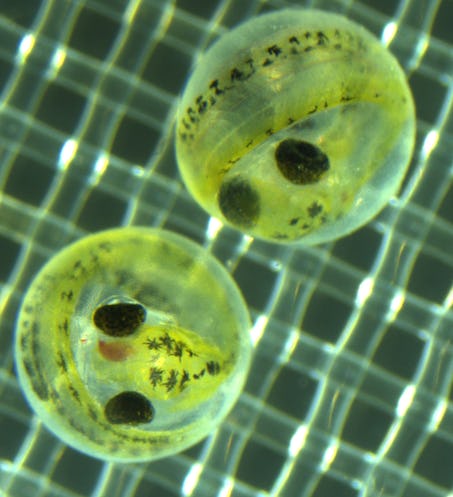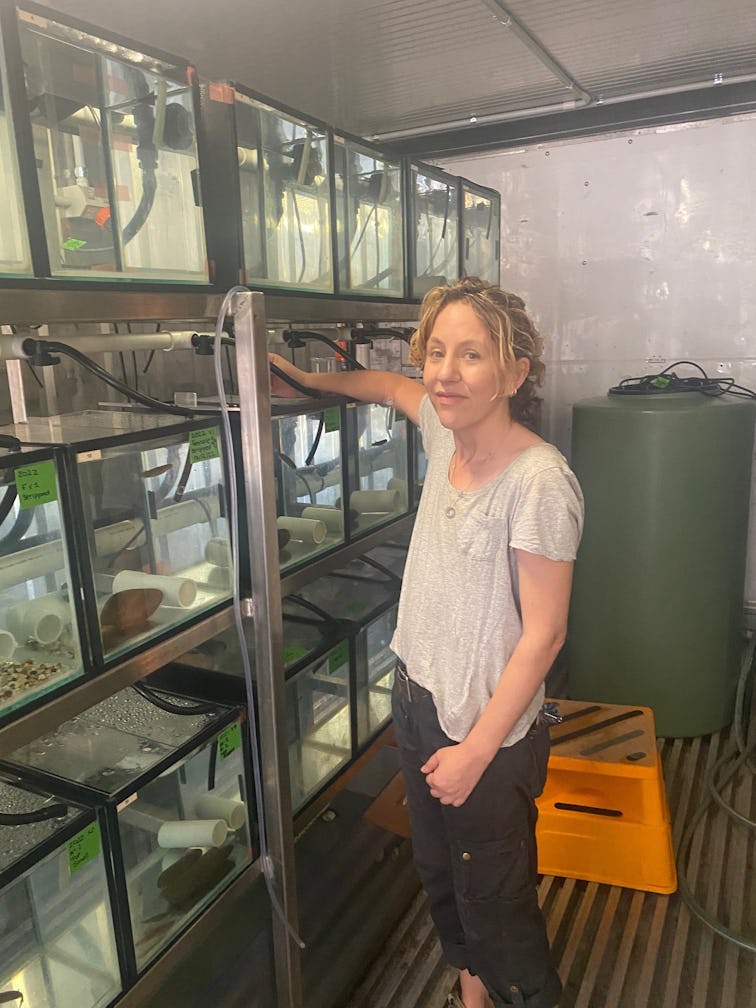The stocky galaxias fish, living in an isolated creek upstream from Mount Kosciuszko National Park, faced extinction as heavy rain following the 2019/2020 fires threatened to pollute their freshwater creek with ash and sediment. Now, thanks to a successful breeding program managed by a dedicated team, their future looks brighter.
With the worst of the fires over, Assoc. Prof Mark Lintermans and a colleague swooped into the park to rescue over 100 of the critically endangered stocky galaxias fish from Tantangara Creek.
Predated by larger introduced species like trout, population numbers for the small Australian fish had dropped to a few thousand. Its habitat had shrunk to an isolated area of around 3.5 square kilometres where natural rock walls and waterfalls protected the fish from larger species.
Some of the rescued fish were sent to the Gulbali Institute at Charles Sturt University where a captive breeding program has helped the species recover. They were housed in a specially fitted shipping container with a cooling system to replicate the cooler temperatures of their creek in the mountains. All gaps on the fish tanks were also carefully closed and monitored to ensure this plucky alpine species, that can jump and climb, didn’t escape their tank home.
Dr Amina Price who led the breeding program said, “we had to cover the hole where the inlet hose entered the fish tanks with specially designed disks to ensure these were closed without gaps. With even a 2mm or 3mm gap, we found the fish could push the disk up overnight.”
Experiencing limited success in breeding through natural means, the team attempted a more hands-on-approach using a technique that involved gently squeezing the fish to remove eggs and sperm called hand stripping.
“When a species is endangered, everything you do matters because you can't really afford to lose any. Using techniques like this can be stressful,” said Dr Price.
“When you use hand stripping on a larger species you can see the target area but on these smaller bodied fish the process can be a lot more difficult. We were concerned about whether the fish would survive the process.”
Thankfully the technique worked. The team had zero mortality and assisted egg fertilisation was successful in hatching new fish.

Successful assisted breeding program has brought the stocky galaxias fish back from the brink
The breeding program has been so successful that the stocky galaxias fish will be involved in a soft release at the end of April, 2023. The fish will be released into a custom built solar-powered site near Eucumbene dam provided by the New South Wales Department of Primary Industries.
“It's really exciting,” said Dr Price. “Rather than just putting them straight back out into the wild, they're going to go into a managed site so we can get more genetic diversity from fish bred in the wild.”
Importance of saving smaller species
“One of the challenges we’ll have to this process is trout,” said Dr Price as she spoke about reintroducing the stocky galaxias fish back into the wild.
“Most people have no awareness of our small bodied fish species at all. Even lots of recreational fishers who know their fish really well and really care about fish, will often look at these smaller fish and discount them as guppies or juveniles.”

Rescued fish sent to the Gulbali Institute at Charles Sturt University joined a successful breeding program.
“We don’t have many fish species in Australia, but a lot of the species we do have are small-bodied fish. These smaller, less known varieties are no less important than larger varieties that tend to attract more funding. Small bodied species have a very important role to play as they provide a food source for bigger fish as well as water birds.
“I’m certain there is a way to have trout around that people can fish for, but perhaps these could be kept out of some environments so smaller species like this can have a chance.”
Value female scientists bring to research
Managing water environments and endangered fish wasn’t always Dr Price’s primary focus. As a university student she had no intention of studying science. Her passion for bushwalking, being outdoors and wanting to make a difference led her towards a role as a park ranger.
But as her studies began, her curiosity was sparked to understand how animals, plants and ecosystems worked. Dr Price completed a PhD specialising in freshwater ecology at the University of Canberra and now leads research with ecology students.
Dr Price’s advice for women planning a career in science is to see their differences as a source of strength.
“Women have different ways of doing things,” said Dr Price. “And that difference in perspective is actually really, really important in terms of producing quality outcomes because I think it takes diversity not just across gender, but diversity across lots of different things.”
“Remember that there isn't a single version of what a successful scientist looks like, or a single version of what a successful career pathway looks like. For women, your career pathway might take some detours and it might take you longer and everything else, but that's actually okay.”
Planet Ark does not take responsibility for the accuracy of the original information and encourages readers to check the references before using this information for their own purposes.